|
|
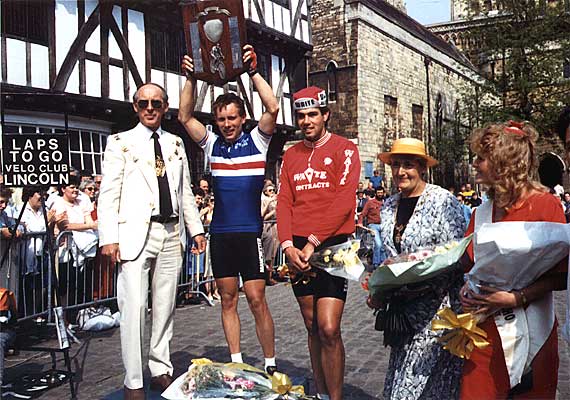 Paul
Curran produced yet another brilliant performance to win the Lincoln Grand Prix
for the third consecutive year on Sunday. The British road race champion won
alone, covering the 100-mile race in a time of 3 hours 58 minutes 47 seconds.
Paul
Curran produced yet another brilliant performance to win the Lincoln Grand Prix
for the third consecutive year on Sunday. The British road race champion won
alone, covering the 100-mile race in a time of 3 hours 58 minutes 47 seconds.
It was a splendid one-two for his Manchester Wheelers-Trumanns Steel club as Mark Gornall took second place 59 seconds behind, after dropping Ben Luckwell (VC St Raphael) third at 1-10.
These three had gone out front in the closing laps of the fast race which climbed the 1-in-6 paved Michaelgate 12 times with the race finishing in Castle Square beneath the towering Norman cathedral.
Fourth at 1-42 was cyclo-cross star Chris Young (Paragon RT) who won the Lincolnshire Echo King of the Castle competition fought out on the narrow very difficult Michaelgate climb each lap.
Man of the race was Luckwell, the BCF Star Trophy leader in all the big moves which shook this race apart.
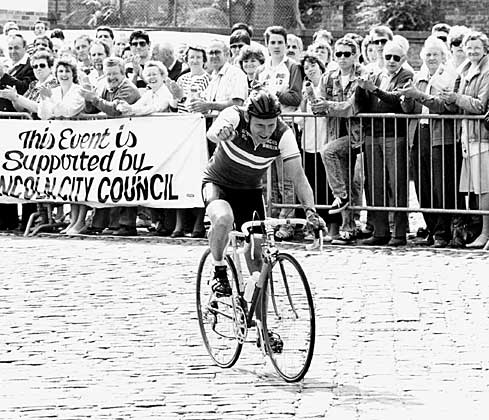 Some
108 riders had started this VC Lincoln promotion on closed roads, and the pressure
was on right from the start. Within one eight-mile lap the bunch began shedding
men, the speed and the wind cutting them loose.
Some
108 riders had started this VC Lincoln promotion on closed roads, and the pressure
was on right from the start. Within one eight-mile lap the bunch began shedding
men, the speed and the wind cutting them loose.
By 12 miles 20 men had been swept out of the back and by 20 miles, after two climbs of Michaelgate, the first big move had gone, 10 men were out front.
They included Longbottom, Luckwell and Young. Through the right-angled blind bends of Burton Village at over 50 mph, they stormed off the ridge to join the A57 main road where for the first mile the wind forced them into echelon.
The big field split and reformed at speed down here, and then bunched up as the course turned into the wind towards the old grandstand.
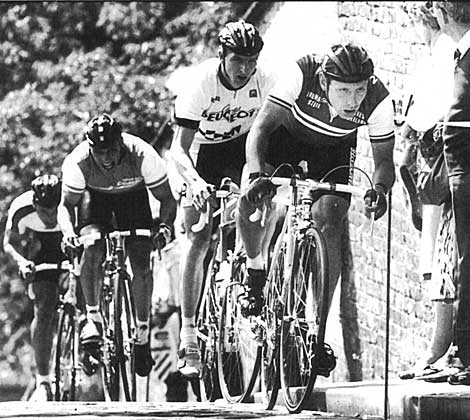 Soon
the counter attacks began, with Curran in a second chasing group of seven catching
six in front which in turn joined the leaders. And from behind, more determined
men zoomed up to make it 40 men in front with 45 miles racing gone.
Soon
the counter attacks began, with Curran in a second chasing group of seven catching
six in front which in turn joined the leaders. And from behind, more determined
men zoomed up to make it 40 men in front with 45 miles racing gone.
Eight men took off with 32 miles left and this was the final selection. It remained only to see which of them had the cunning and the legs to finish the job. Curran was that man. The king finally had the chess board to himself after all the other pieces had been blown away.
Some riders found themselves out through sheer bad luck. Lee Travis was one. The Stone Wheeler was one of about 25 riders who tangled and fell on the second ascent of Michaelgate. No injuries as men picked themselves up, many running the steepest section before remounting, but for Travis with a broken bike his race was over.
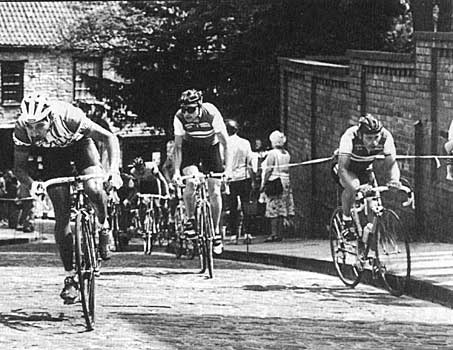 When
the 10 men broke clear of the field after only 20 miles besides Luckwell, Longbottom
and Young, they also included other useful names: second favourite Karl Smith
(Paragon RT); David Baker (Ace RT); Nick Noble (VC St Raphael); Wayne Randle
(Chesterfield Coureurs); David Cook (Centre of Excellence, North); multi-track
champion Cohn Sturgess (Team Haverhill), and David Brooker (VC Etoile).
When
the 10 men broke clear of the field after only 20 miles besides Luckwell, Longbottom
and Young, they also included other useful names: second favourite Karl Smith
(Paragon RT); David Baker (Ace RT); Nick Noble (VC St Raphael); Wayne Randle
(Chesterfield Coureurs); David Cook (Centre of Excellence, North); multi-track
champion Cohn Sturgess (Team Haverhill), and David Brooker (VC Etoile).
Randle, a winner of the Wincanton International, and Cook a stage winner in the recent Tour of Lancashire, were particularly dangerous. But this break lacked consistent driving force, almost as if it knew a reaction from behind would have them back.
And so it proved. Young took the fourth climb of Michaelgate from Smith and Luckwell, while Longbottom got tangled in the tapes half-way up and fell, his chain coming off. Such is Longbottom's ability he was quickly chasing to rejoin within a mile.
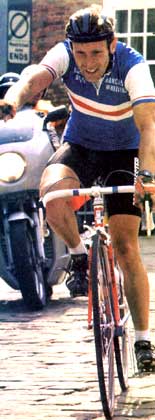 News
came that Curran was organising a chase, and the 10 men became nine as Brooker
was dropped, to be swept up by the chasers.
News
came that Curran was organising a chase, and the 10 men became nine as Brooker
was dropped, to be swept up by the chasers.
The first chasing group of six contained Dave Spencer (Paragon RT), author of a long break on stage two of the Tour of Lancashire. With him was Neil Hoban (Vulcan CRC) and Gornall. In sight only a few hundred metres behind came seven men led by a determined Curran who had decided that no-one should gain too much headway on him.
Through the city for the fifth time, the nine leaders eased a little and the junction was made by the Spencer and Curran groups and finally the remnants of the field. The first act was over, 60 men had gone, 40 remained in with a chance.
A fine effort by Andy Wilkinson (Port Sunlight Wheelers) saw him needlessly bridge a gap from the chasing field to the break before his late companions also arrived to cancel out his endeavours.
Now Luckwell and Norman Dunn (Manchester Wheelers) went clear on the sixth ascent of Michaelgate, gaining 100 metres, the tall figure of Luckwell easily spotted over the heads of the chasers as they passed the halfway point of the race.
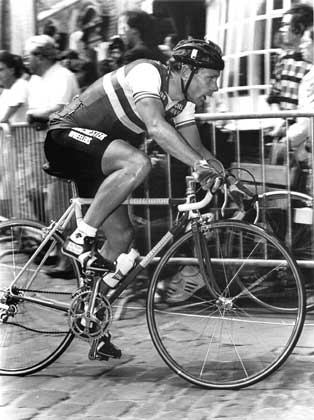 That
slight lead drew out the others in pursuit, and the 40-man group stretched,
each man fighting to find shelter from the wind. With no descent after the cruel
ascent of Michaelgate the flat roads out of the city allowed no time for anyone
to recover. The pressure was on again and the line broke, eight men forming
at the front, to draw relentlessly away towards the country again where they
disappeared from sight through Burton Village.
That
slight lead drew out the others in pursuit, and the 40-man group stretched,
each man fighting to find shelter from the wind. With no descent after the cruel
ascent of Michaelgate the flat roads out of the city allowed no time for anyone
to recover. The pressure was on again and the line broke, eight men forming
at the front, to draw relentlessly away towards the country again where they
disappeared from sight through Burton Village.
Eight good men were in command: the Curran group was in reality the Manchester Wheelers group, with four of them on board - Curran, Longbottom, Gornall and Dunne. The others were Roy Chamberlain (Sapphire RC), Young and Mike Twelves (Tunstall Wheelers).
With five of this number Milk Race selections (Curran, Longbottom, Dunne, Young and Twelves) it was reasonable to assume they would not be caught.
For a while, as they piled it on, the Manchester quartet doing a lot of the work, some of the excitement went out of the race after all that hurly-burly provided by the big field trying to hold together.
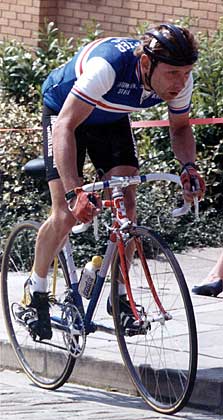 After
all that aggravation the race seemed to have lost its bite.
After
all that aggravation the race seemed to have lost its bite.
That was only an illusion as the eight powered on, the distance and speed telling on each one in its different way, and the party sussing each other out.
Curran was keenly interested in Luckwell. Three times they were to climb Michaelgate together, and each ascent provided them with evidence of each others state.
With the nearest chasers led by Spencer and Paul Rogers (VC St Raphael) at 1-24, they had only each other to worry about. The main field were at 2-12, what was left of them.
On the penultimate climb Curran was seen drifting to the back. It was a well-known sign of his intentions. He was preparing to strike. He had seen Luckwell falter on an earlier ascent. But it was Gornall who sprang clear first, to take the prime. Quickly Luckwell and Curran joined him and they gained 15 seconds on their late companions.
This was a remarkable effort from Gornall, not long recovered from a back injury. He hurt himself at work and was in plaster with a compressed vertebra.
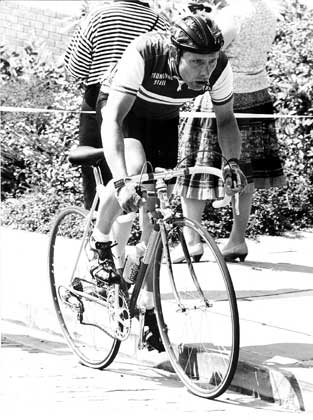 Now,
some two months later, he was pouring coal on the fire as the three-up break
distanced themselves from the others; 35 seconds, 40 and then 48 seconds in
a matter of minutes. Luckwell was doing a lot of the work as they once again
approached the city of Lincoln blessed with warm sunshine all day.
Now,
some two months later, he was pouring coal on the fire as the three-up break
distanced themselves from the others; 35 seconds, 40 and then 48 seconds in
a matter of minutes. Luckwell was doing a lot of the work as they once again
approached the city of Lincoln blessed with warm sunshine all day.
Luckwell seemed to know Curran's game as the British road champion hung back from taking the front as they threaded the shopping centre and began their 11th climb to Castle Square.
Big Luckwell succeeded in forcing Curran to the front as the climb reared up.
Then came an instantaneous decision by Curran. Hardly had Luckwell congratulated himself on getting Curran into the lead, then his opponent shot into the attack on the steepest section.
With a beautiful manoeuvre, Curran brushed by Luckwell and was gone. Luckwell, rather like a passenger clipped by an express train, could only watch as Curran, who had flicked down a gear, pedalled away at speed. Then Gornall, who had looked vulnerable, also dived away to the right, up the roughly paved road.
Out of the city with one lap to go, Curran had 33 seconds lead as Luckwell regained Gornall. His lead grew. There was little in his style to suggest suffering, except he was pulled right forward to the edge of his saddle.
Taking the Burton descent at over 55mph, he joined the wide and empty A57 for the last time and just kept on going, an unrelenting effort timed to perfection.
And his last ascent of Michaelgate was an example of a champion at work, for he rode hard on the left, dangerously close to tangling with the tapes, flicking around each iron stake like a skier on a slalom course with a difference: this was uphill.
Curran became only the second man to achieve the hat-trick emulating the late Ron Coe in 1957-1959.
Paul Curran's third consecutive victory in the Lincoln Grand Prix was all the more impressive because the British champion was not feeling at his best.
After winning with apparent ease after another of those calculated, powerful attacks on the fearsome Michaelgate climb with one lap to go, Curran made us wonder at his hidden resources when he explained: I've not been feeling particularly good. I had a cold a week ago, and the cough hasn't got better.
"I wished I'd gone to the doctor last week, I'll go on Monday. I didn't feel good so I tried to leave it for as long as possible. When I saw Ben (Luckwell) lose a place on the hill. I thought that was the place to go, (on Michaelgate).
'And he had worked quite hard on that lap before. I was quite worried because he's a very strong lad, when he came up to us and that had me worried."
Curran had risked getting tangled with the crowd-control tapes on the steep paved climb to the finish, brushing along them and flipping around the iron stakes in the gutter. A few laps earlier his Manchester Wheelers team-mate Pete Longbottom had come to grief and fallen because he had got tangled.
"I was trying to get my wheels on the smooth bit of road," he said referring to the gutter.
"I was dancing up the hill - my back wheel skips on rough roads because I'm so light. As long as my elbow rubbed on the tape, I was all right," said Curran laughing.
Did he have any bad moments?
"With about four to go I felt pretty rough," he replied. "It was that windy, I didn't want to be out there alone that long. A lap was enough."
When the 10-man break went away after about 20 miles, what did he think about that? Curran was in the second-chasing group.
"I thought maybe it was a little bit too early. But you can never tell. Some breaks go, never to be seen again.
Longbottom was up there, so that was encouraging. It wasn't too dangerous and wasn't too hard to get up to it."
In all the major moves. Ben Luckwell had looked capable of taking the honours. But he had no answer to Curran's attack when it came. The Star Trophy leader said. "I didn't feel too good. I could have gone better. I was struggling on the climb because I am too heavy. It was definitely not suited to someone of my build," added the six-footer.
Still I was second-overall in the mountains competition which isn't too bad for someone who is 12 1/2 stone.
"When I got across to the group with Curran and Gornall I knew I had no chance."
1. PAUL CURRAN (Manchester Wh.Trumanns Steel) 100m
in 3.58-47
2. M. Gornall (Manchester Wh) at 59sec
3. B. Luckwell (VC St Raphael) at 1-10
4. C. Young (Paragon RT) at 1-42
5. P. Longbottom (Manchester Wh) at 1-48
6. N. Dunn (Manchester Wh) at 2-52
7. M. Twelves (Tunstall Wh) at 3-1
8. R. Chamberlain (Sapphire RC) at 3-14
9. D. Spencer (Paragon RT) at 4-43
10. A. Wilkinson (Port Sunlight Wh) st
11. P. Rogers (VC St Raphael) at 4-50
12. N. Hoban (Vulcan CRC) at 5-41
13. A. Guy (Sapphire RC) st
14. G. Baker (Anglia Sport)
15. S. Shaw (Brook CC) at 6-17
16. D. Baker (Ace RT) st
17. M. Coll (Ace RT) at 6-24
18. W. Randle (Chesterfield Cour) at 6-34
19. J. Ward (Chesterfield Cour) at 6-34
20. L. Masefield (Olympia Sport) at 6-44.
Lincolnshire Echo King of the Castle. - Chris Young (Paragon RT.Gazelle) 4lpt; 2, Gornall 32; 3, Luckwell 30.
REPORT KEITH BINGHAM. PICTURES STEWART CLARKE